Need help? We're here!
(888) 312-8812 Login Signup4 Tips To Avoid Costly Truck Repairs
January 18, 2021

Image Source: Pixabay
Trucking is an expensive business, and a huge amount of that money often ends up in repairs. According to industry statistics, truck maintenance and repairs cost owners an estimated $15,000 annually, although this may increase if the truck is an older model. But while wear and tear and eventual breakdown of parts are inevitable, there are ways to lengthen the service life of your truck and keep repairs to a minimum.
Just like the health of the driver, keeping the truck in top shape at all times should be a priority. In this guide, we'll share some tips you can follow in maintaining your truck and avoiding expensive repairs.
Frequent checkups are key.
Regular inspections are the bedrock of a quality truck maintenance program. Even simple examinations will help identify early signs of damage or wear in the engine and other key components, which need immediate action and proper diagnosis to prevent more severe problems and repair later on.
A maintenance inspection checklist varies from one operator to another, but among the essential parts to check include:
- Engine. A compression test is a must before every trip. This will reveal the condition of the engine valves, valve seats, and piston rings and whether they are wearing evenly. Also, make sure to check the engine coolant, temperature, and oil and boost pressure, and address any irregularities.
- Brakes. The last thing any trucker wants is for the truck's brakes to fail in the middle of the road. This can be prevented by a thorough check of various brake components, specifically the brake rotors, drums, calipers, and brake lines. Friction material such as those found in brake pads and shoes must also be inspected for proper wear pattern and replaced as necessary.
- Tires. Make sure to check for optimum tire pressure and that they're consistent on all the tires. Overinflated tires tend to wear out faster and are more susceptible to blowouts. Tire tread wear also affects the overall integrity of the wheel and fuel efficiency.
- Electrical systems. The key parts to check are the alternator, motors, and batteries. Ensure that wires are not loose and do not show any signs of fraying and other types of damage. If there are any issues with the wiring, have an expert fix them to prevent further problems from popping up later on.
- Lubrication. Oil and lubricants tend to degrade or break down over time, leading to increased friction and the likelihood of the affected parts' failure. This is why it's crucial to have the oil strictly replaced according to schedule.
We also recommend conducting an inspection using the maintenance checklist after every trip. This post-checkup will help identify any parts that may have been damaged or worn out while traveling and repair them as soon as possible. This is especially critical if the truck is driven by more than one person, as it ensures any issues are addressed before the truck is handed over to the next driver.
Maintain a record of the truck's condition and repair work.
An updated record will serve as a to-do list to organize maintenance checks and schedules and prevent missing particular procedures or overlaps in the process. It will also help both the driver and mechanic monitor parts of the truck at risk of failure and resolve issues that need to be resolved as soon as possible.
Aside from keeping a record, it's also important to note any issues encountered while driving. Whether it's a noise that seems out of place or a niggling sensation at the wheel, make sure to put it into writing. With all the things you need to pay attention to while driving, such relatively minor issues are most often forgotten once the truck rolls into the shop. So make sure to keep a record of every little thing, and let your mechanic know about it at your next visit. This is especially important if more than one operator drives the truck to prevent such issues from being overlooked.
Clean your truck regularly.
One of the simplest ways you can prevent unnecessary repairs is by keeping your truck clean. Whether it's from humid weather or transporting harsh chemicals, corrosion and overall deterioration are often the main reasons why trucks are retired compared to other vehicle types. And if left exposed for too long, rust will steadily eat away at your truck's parts, compromising the truck’s performance or even its structural integrity in the process.
Ideally, it would be best if you had your truck washed at least once every ten days. This will keep dirt, mud, oil stains, and other contaminants from harming the clear coat, paint, and bare metal. It's also recommended to have the vehicle washed immediately after being exposed to rain. Rain collects pollutants, particularly those in urbanized areas, resulting in corrosive acid rain. If you're an owner/operator, consider investing in some premium paints with anti-rust properties for the truck's exterior as well. A well-sealed coat of paint will help protect the metal surfaces from corrosion and dents and scratches for years to come.
Use only high-quality replacement parts.
Of course, even with the best maintenance practices, it's inevitable that some parts of your truck will wear out over time. These worn-out parts must be replaced as soon as possible, even if they appear to be still functioning, as they could sabotage the truck's overall performance and put the drivers and others on the road at risk.
In addition, when making repairs, it is also essential to use high-quality parts. It's recommended to replace worn-out components with original equipment (OEM) parts or aftermarket parts certified to comply with OE specifications. OE standards ensure that the part is designed and manufactured according to its exact specifications as its stock counterpart. This is especially important for components located in high-stress systems, such as shock absorbers and brake rotors, as it ensures reliable performance and compatibility with other parts connected to it. While these parts tend to have a higher price tag, it'll also prevent premature repairs in the future and save you money in the long run.



